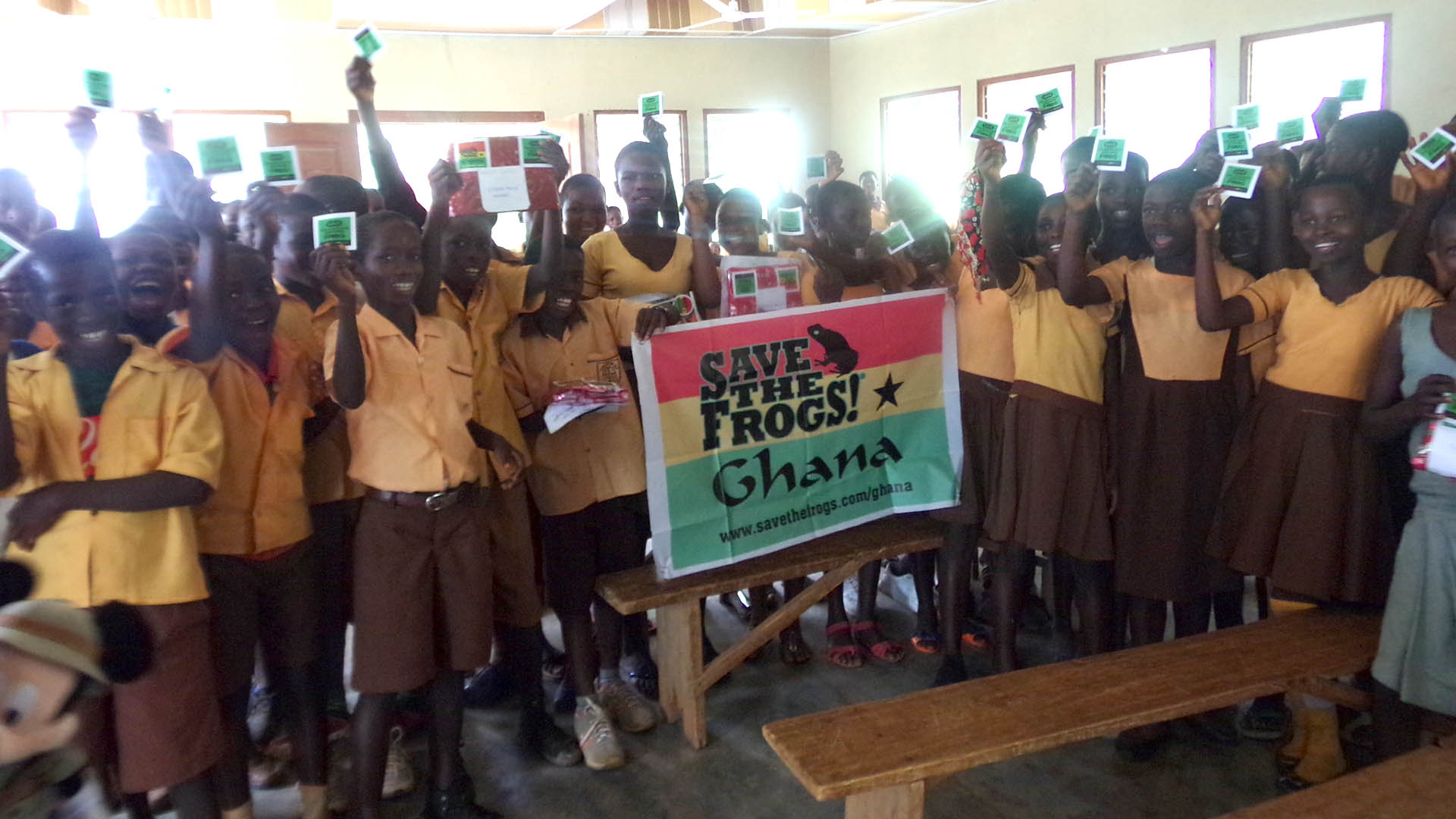SAVE THE FROGS! Ghana’s efforts have resulted in a huge victory for the Giant Squeaker Frog (Arthroleptis krokosua). From 2015 through early 2019, SAVE THE FROGS! Ghana Co-Founders Gilbert Adum and Dr. Kerry Kriger campaigned for the re-categorization of the Giant Squeaker Frog by the International Union for the Conservation of Nature (IUCN), from Near Threatened to Critically Endangered. Success was achieved in March 2019 with the IUCN officially re-categorizing the frog as Critically Endangered. This new listing will help the Giant Squeaker Frog receive significantly increased protections and will enable conservation groups like SAVE THE FROGS! Ghana to more easily secure funding for conservation programs in and around the frog’s habitat in western Ghana.
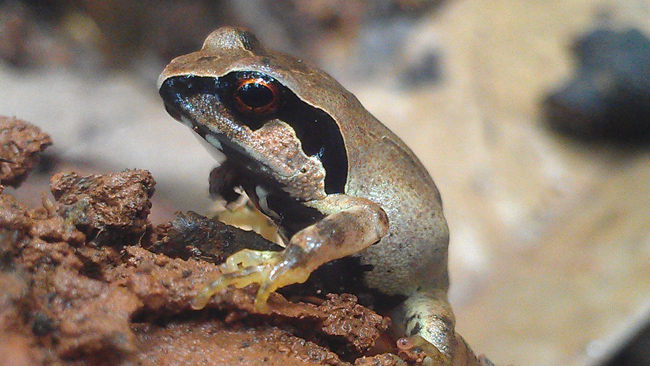


The Giant Squeaker Frog (Arthroleptis krokosua).
Though one of the world’s most endangered species, the Giant Squeaker Frog was listed by the IUCN as Near Threatened in 2015. Such categorization is essentially equivalent to “Not Threatened” and affords the species virtually no protections. Critically Endangered on the other hand indicates the highest vulnerability risk of a species to extinction and serves as a call to action to urgently implement all necessary conservation strategies to slow down human-induced threats and prevent the species’ extinction.
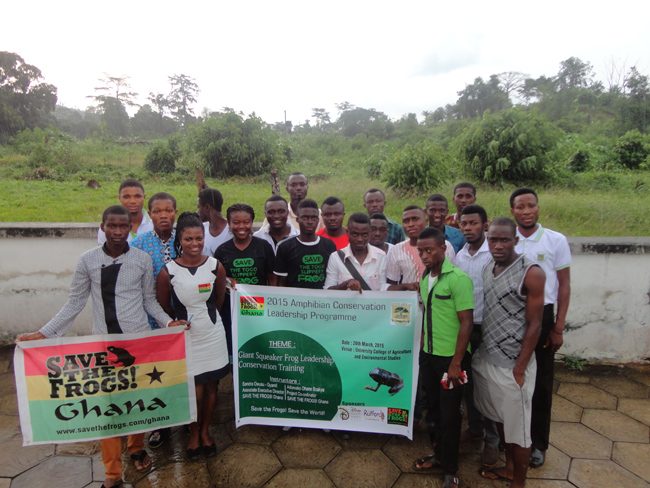


Participants of the Giant Squeaker Frog Leadership Conservation Training conducted by SAVE THE FROGS! Ghana in 2015. The workshop was funded by SAVE THE FROGS!, The Rufford Foundation and the Disney Worldwide Conservation Fund.
IUCN’s classification of the conservation status of a species is based on a number of considerations, including population size and rate of decline; geographic range; data to indicate high probability of extinction in the wild; and size of home ranges. Through years of research, SAVE THE FROGS! Ghana accumulated significant amounts of data on the Giant Squeaker Frog and provided it to the IUCN for the re-categorization assessment. Some of the key issues that aided in the successful revision included:(1) The species’ original habitat in the Krokosua Hills has been destroyed, and the species may no longer occur there.(2) The species occurs in very small, patchy and unconnected areas subjected to severe human induced threats including logging, farming and small-scale mining activities.(3) There are believed to be fewer than 250 mature individuals, with nearly all the extant population in a single location, the Sui River Forest Reserve. In fact, to date, less than 50 individual frogs have ever been recorded.(4) Only a small number of individuals survive to adulthood.(5) Recurrent wildfires have become an increasingly severe threat to the frogs.(6) Efforts to find specimens at Mount Nimba in Guinea (where an individual frog was found several years ago) have proven futile.
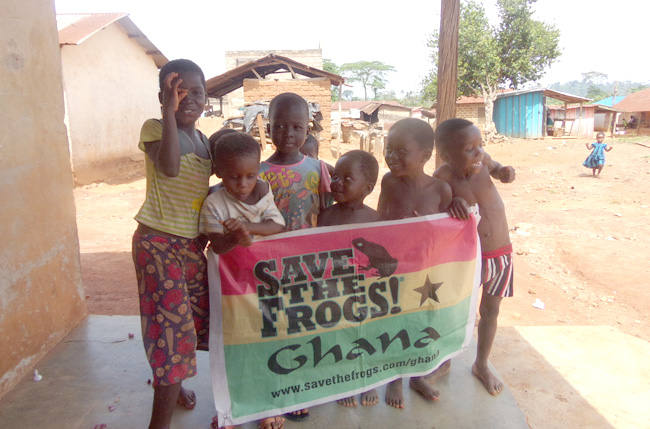


Young SAVE THE FROGS! supporters in the village of Yawkrom, where SAVE THE FROGS! Ghana has been involving the community in Giant Squeaker Frog conservation efforts for many years.
With the revision to Critically Endangered, SAVE THE FROGS! Ghana’s conservationists and others now have better grounds to lobby government for change in policies to help create safe havens for the species and other co-occurring biodiversity. Already, SAVE THE FROGS! Ghana has initiated inventories of all the major taxonomic groups to help re-designate the reserve as a Key Biodiversity Area (KBA). Achieving KBA status help will ensure local people benefit from the protection of the frog’s habitat and are empowered to prevent the Giant Squeaker Frog’s extinction.
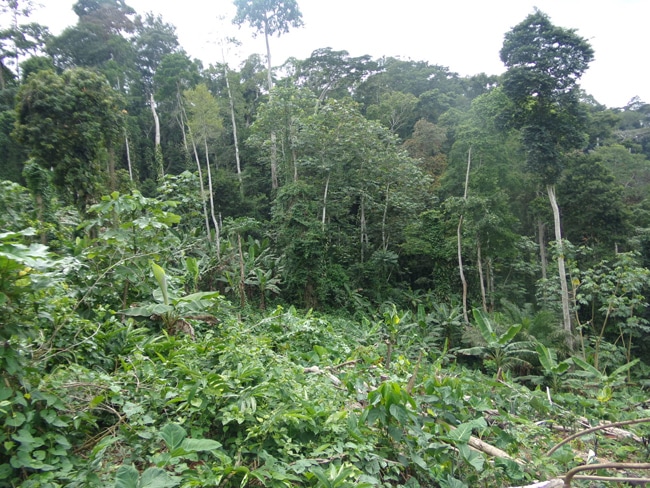


An Illegal farm moves in after wildlfires destroy Giant Squeaker Frog habitat. The farms prevent the regrowth of the forest. SAVE THE FROGS! Ghana has been conducting beekeeping training programs in Yawkrom to reduce the number of villagers who collect honey from the forest; the beekeepers often chop trees and then set fires to smoke out the bees, and wildfires are the result.
Originally known to science from only its holotype (collected in southwestern Ghana’s Krokosua Hills Forest Reserve), the Giant Squeaker Frog was rediscovered in 2009 by SAVE THE FROGS! Ghana Executive Director Gilbert Adum. The 2009 rediscovery at Sui River Forest Reserve increased the number of known individuals to 15. However, the species was not sighted again until 2015, after several years of dedicated surveys by SAVE THE FROGS! Ghana staff and volunteers, when another 15 individuals were found, including for the first time, gravid females. This brought the known population size of the species in the wild to 28 total individuals!
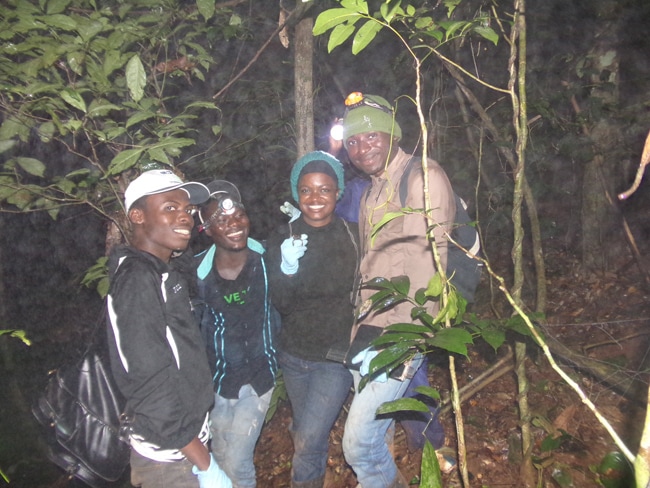


The SAVE THE FROGS! team surveying for Giant Squeaker Frogs in 2015.
From 2010 until 2015, the Giant Squeaker Frog was listed by the IUCN as endangered, but an unpublished record in 2015 from Mount Nimba in Guinea (where one specimen was sighted and then collected) resulted in the Giant Squeaker Frog’s re-classification from ‘Endangered’ to ‘Near Threatened’, which many amphibian conservationists viewed as a rather quick and harsh categorization of a species whose population numbers were so low. Additionally, most of the frogs’ known home ranges are severely threatened, as they are “production forest”, which means controlled logging is permitted, and unfortunately, production forests are often plagued by several illegal activities as well.
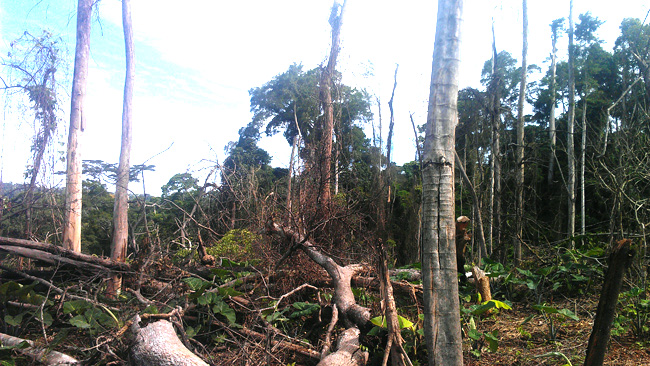


Illegal logging in the Sui River Forest Reserve
Fortunately, SAVE THE FROGS! Ghana’s consistent surveys over the years and dedicated campaigning on behalf of the frog successfully translated science into action and have provided the Giant Squeaker Frog with increased hopes of survival. The SAVE THE FROGS! Ghana team is grateful to all our donors who make our efforts possible, and to the IUCN Amphibian Specialist Group for re-assessing the status of the Giant Squeaker Frog.
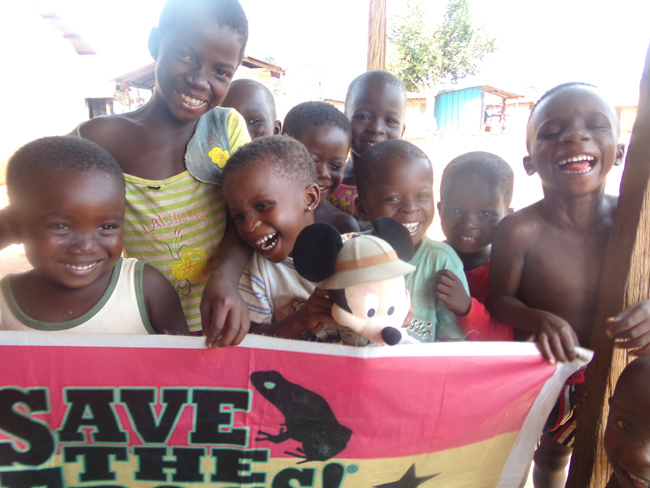


Future frog savers of the world.
You Can Help Save The Giant Squeaker Frog
We encourage you to donate to SAVE THE FROGS! Ghana today and thereby increase our ability to protect the critically endangered Giant Squeaker Frog.
Your donation will be securely processed and delivered to Ghana by SAVE THE FROGS! USA. Donations are tax-deductible for USA donors. Thank you for your support!
“Kerry, this is good news and can be a springboard to encourage other groups protect their frogs. Well done and congratulations to STF! Ghana participants.Dr. John E. Cooper, Cooper Environmental Research, New York”
Your financial support is greatly appreciated!


